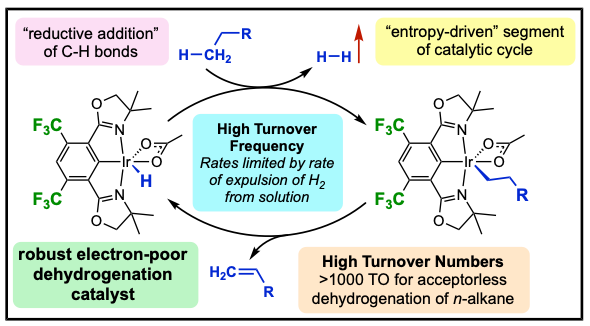
Dehydrogenation of alkane with developed catalyst.

Invention Summary:
Olefins (alkenes) are key intermediates in the production of fuels and many commodity chemicals. Alkanes, and particularly light linear alkanes, are increasingly abundant but of limited value. The dehydrogenation of alkanes is therefore an economically very attractive route to olefins.
Researchers at Rutgers University have developed highly effective and regioselective catalysts for the dehydrogenation of n-alkanes. The developed catalysts result in high turnover numbers, >1000 TO, and are particularly effective for the acceptor-less dehydrogenation of n‑alkanes, in which no sacrificial acceptor is required and the only by-product is dihydrogen. The reaction rate under typical conditions was found to be limited by the rate of expulsion of dihydrogen from a simple reaction vessel in which reflux of the solution provided the driving force for H2 expulsion.
Advantages:
- Highly effective and non-obvious catalyst for alkane dehydrogenation
- Convenient synthesis
Market Applications:
- Chemical intermediate manufacturing
- Petrochemical industry
- Automobile
Intellectual Property & Development Status: US Patent US 2021/0291154-A1. Available for licensing and/or research collaboration. Please contact marketingbd@research.rutgers.edu